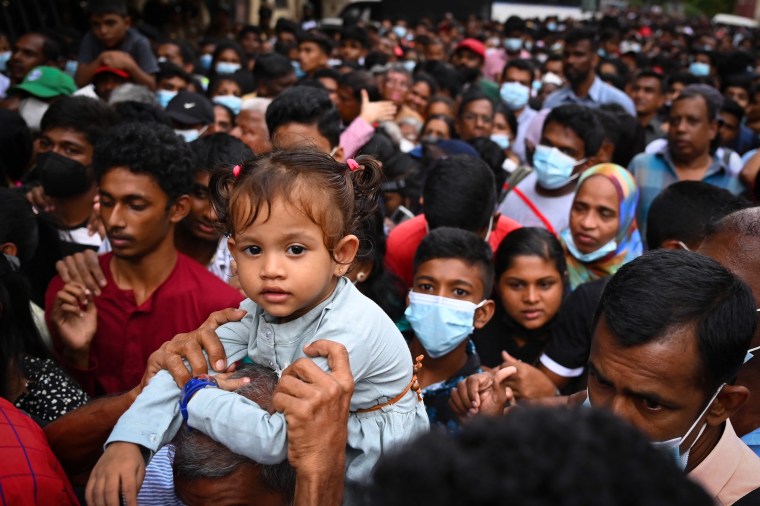Sri Lanka’s worsening economic crisis has erupted in recent days with the dramatic storming of the presidential palace, prompting the president and prime minister to offer their resignations and leaving the country’s future hanging in the balance.
On Wednesday, President Gotabaya Rajapaksa fled the country for the Maldives, hours before he was due to step down.
Here’s how the country became mired in its worst economic, political and humanitarian crisis in over 70 years.
What is happening in Sri Lanka?
The island nation’s growing economic crisis reached a crossroads this week after both its president and prime minister agreed to resign after months of mass protests culminated in the storming of their residences and other government buildings.
Tens of thousands of protesters set the residence of the prime minister on fire and occupied the presidential palace on Saturday. Photos showed protesters swimming in the presidential pool and lying on the president’s bed.
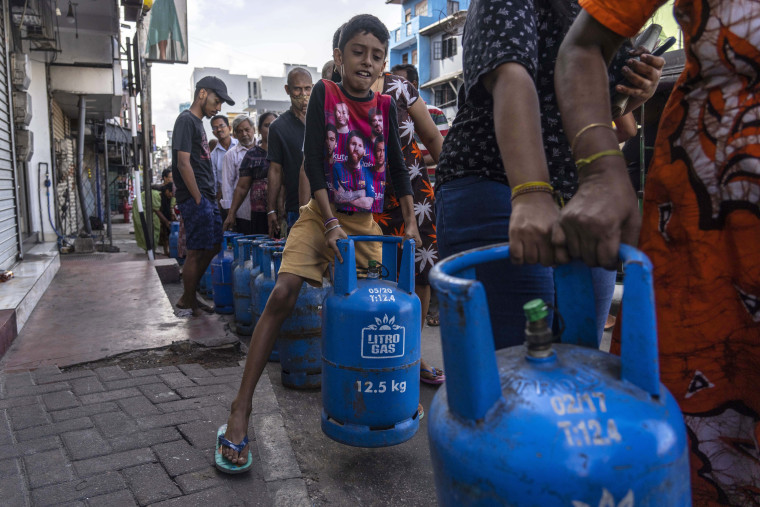
Protests against Rajapaksa’s government have rocked Colombo, the capital, since March, as people found it increasingly harder to buy basic necessities such as food and fuel.
Rajapaksa and Prime Minister Ranil Wickremesinghe are the latest to offer their resignations amid the crisis, with almost all of the country's Cabinet resigning in early April, followed by the previous prime minister, Mahinda Rajapaksa, the president’s brother, in early May.
Ten days of bailout talks with the International Monetary Fund ended without a deal at the end of June, but the international body has vowed to keep the negotiations going. Wickremesinghe last week declared that his country's economy had collapsed, telling the IMF he aimed to file a debt restructuring proposal by August.
Why are people protesting?
The economic crisis, Sri Lanka’s worst since it gained independence from British rule in 1948, has plunged the country into a humanitarian crisis, with many in the country of almost 22 million struggling to secure even daily necessities, as dwindling supply and growing inflation has sent prices soaring.
Medicine has also been hard to find, and lengthy blackouts and long lines for fuel have plagued the country since April.
The United Nations warned in early June that Sri Lanka was facing a dire humanitarian crisis, with millions already in need of aid. More than three-quarters of the population had reduced their food intake due to the country’s severe food shortages, according to the agency.
The United Nations in Sri Lanka last month launched a bid to raise $47.2 million to assist the 1.7 million people most affected by the crisis. Around 5.7 million were in need of immediate life-saving assistance, the agency estimated.
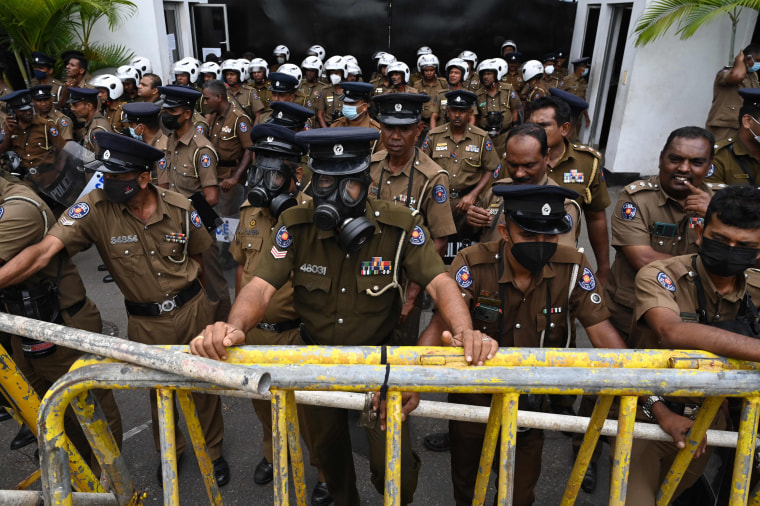
That assistance, however, barely scratches the surface of the $6 billion the country will need to stay afloat until the end of the year, according to The Associated Press.
Inflation has soared, reaching 54.6 percent this June, according to the country’s central bank. The government said late last month that the country was nearly out of fuel and halted sales of all gasoline except for essential services.
What is causing Sri Lanka’s economic crisis?
Sri Lanka's low foreign currency reserves means it has been struggling to pay for imports of essential goods. The IMF called the country's foreign reserves "critically low" at the end of June.
The dwindling reserves followed years of mismanagement of the country's finances, with the government spending more than the overall income and production of tradable goods and services. To compensate, the government increasingly relied on its foreign reserves to stay afloat.
The fallout of the 2019 Easter bombings, which saw 260 die in a series of extremist Islamic terrorist attacks in Colombo, and the onset of the coronavirus pandemic in 2020 has also slashed tourism revenue.
A series of decisions by Rajapaksa, who became president in 2019, also deepened the crisis, starting with large tax cuts within his first year in power.
His decision last April to ban chemical fertilizers also drastically decreased the country's crop output, which, coupled with Russia’s invasion of Ukraine in February, has exacerbated rising food prices.
The country pre-emptively defaulted on around $51 billion in foreign debt in April, the first time it had done so. Sri Lanka’s central bank said the country could not afford to repay unless there was a debt restructure.
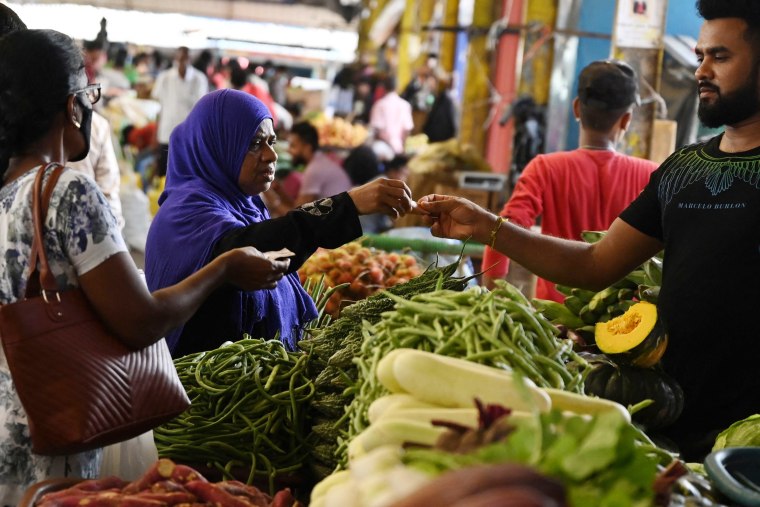
Protesters in Colombo in recent months have blamed the crisis on Rajapaksa, whom they accuse of mismanaging the city’s finances and of corruption.
Who are the Rajapaksas?
Gotabaya Rajapaksa, who will step down as president on Wednesday, hails from a Sri Lankan political dynasty that has dominated leadership for two decades.
A former military officer, Gotabaya served as the country’s defense secretary under his brother Mahinda's presidency from 2005 to 2015.
Gotabaya appointed Mahinda as prime minister when he was elected in 2019.
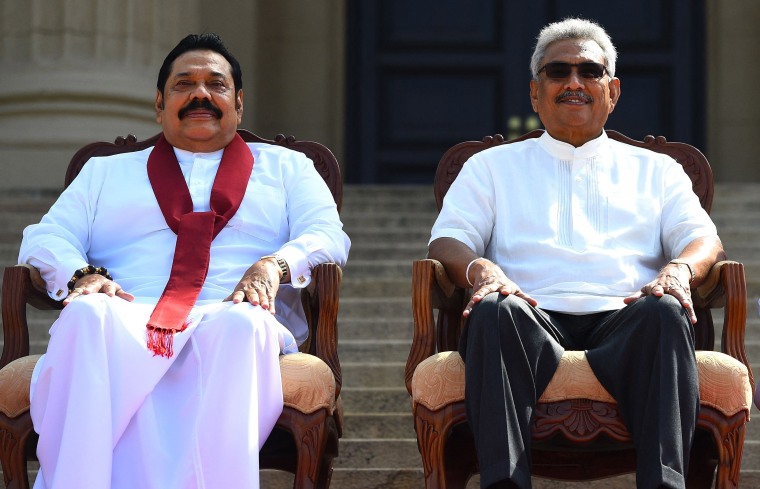
His role in overseeing the government’s crushing of the insurgent force the Tamil Tigers during the country's civil war earned him the nickname "The Terminator."
The disgraced president was also considered to have friendly relations with China, and turned to Beijing for financial help as the crisis unfolded, asking for a $1 billion loan in mid-April.
What happens next?
Sri Lanka’s Parliament will convene over the next five days to choose a new president next Wednesday, its speaker announced on Monday.
Talks are still ongoing with the IMF for a potential bailout for Sri Lanka.
Anit Mukherjee, a policy fellow and economist at the Center for Global Development, a nonpartisan think tank in Washington, said any assistance from the IMF or World Bank should come with strict conditions to make sure the aid isn’t mismanaged.
Still, Mukherjee noted that Sri Lanka is in one of the world’s busiest shipping lanes, so letting a country of such strategic significance collapse is not an option.
Lutz Roehmeyer of Capitulum Asset Management, which holds Sri Lanka dollar bonds, said an IMF deal could happen this year or next, but for bondholders, a restructuring is likely only in 2024 or 2025, not next year.
“It’s total chaos,” Roehmeyer said. “Expectations are that the transition of power will be more chaotic and it will take longer to strike a deal.”
